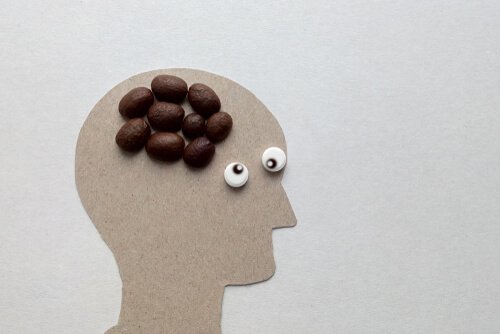The Effects of Caffeine on Depression

Many people are not able to open up their curtain every morning without their daily cup of coffee. But, what are the actual effects of caffeine on someone’s mental health or depression? This question continues to be hotly debated.
When it comes to depression, many believe that caffeine can relieve it, while others warn that it can intensify it. In this article, we’re going to talk about that precisely: the effects of caffeine in depression.
Caffeine is a substance capable of altering your mood. It’s found in the most popular drinks in the world, which include tea, coffee, energy drinks, and many soft drinks. It’s so omnipresent that it’s easy to forget that it’s a psychoactive drug. That is, caffeine changes your brain function so it impacts your mood and your behavior.
Coffee and tea: the effects of caffeine in depression
There’s a good volume of literature with data that supports the hypothesis that caffeine is beneficial in reducing the risk of depression.
For example, a meta-analysis with over 346,000 participants examined the link between caffeine and depression. The study found that caffeine, particularly coffee, protect people against depression. They also found that coffee worked better than tea, probably because of the latter’s lower caffeine content.
Another meta-analysis with 330,000 participants also concluded that the consumption of coffee and caffeine was significantly associated with a lower risk of depression. The studies also showed that the risk of depression as a result of caffeine intake actually decreased when people increased their daily caffeine intake.
“I need coffee to help me change the things I can, and wine to help me accept the things I can’t!”
―Tanya Masse―

Part of the reason why coffee seems to be more effective than tea is that some of its components can counteract the negative effects of depression. Coffee contains chlorogenic acid, ferulic acid, and caffeic acid. These acids may reduce the inflammation of nerve cells that occurs in the brains of people with depression.
Along with the natural antioxidant properties of caffeine, coffee can act as an anti-inflammatory in the affected parts of the brain. This can alleviate some of the discomfort and anguish caused by depression.
However, tea isn’t less effective than coffee in reducing the risk of depression. Green tea, which has high antioxidant properties, can be as effective as coffee in preventing depression.
Green tea also contains folate (vitamin B9), polyphenols and theanine, substances that can work against depression. Even more:
- Some believe that folate is a stimulant of positive valence moods.
- Polyphenols have antidepressant properties.
- Studies prove that theanine increases the levels of dopamine and serotonin in the brain.
How does caffeine relieve symptoms of depression
There’s no doubt that caffeine is a molecule with a fascinating power to alter the chemistry of your brain. The fact is that we don’t have all the answers when it comes to the role it plays in depression.
The prevailing theories defend the idea that depression is caused by either a chemical imbalance, inflammation of the brain, underlying health conditions, genetic propensity, emotional trauma, or stressful life circumstances.
Even though caffeine doesn’t address all of these potential causes, there are two main ways in which the effects of caffeine on depression are positive. Especially because of its positive impact on the brain.
- On the one hand, caffeine increases brain chemicals that stimulate your mood.
- On the other hand, caffeine easily reaches the brain where it alters the activity of two neurotransmitters of particular importance for depression: dopamine and serotonin.
Serotonin is the neurotransmitter that’s most closely related to depression. However, there’s evidence that serotonin levels are eventually depleted due to regular consumption of caffeine. So, regular consumption of caffeine may not be a good long-term strategy for treating serotonin-induced depression.
Caffeine also increases dopamine, the neurotransmitter most closely associated with motivation, focus, and productivity. In contrast, abnormal levels of dopamine can also lead to depression. The effects of caffeine on depression are related to mood improvement, as long as it’s regularly consumed.
The anti-inflammatory effect of caffeine
Besides the theory of chemical imbalance, another theory is emerging. It claims depression is the result of chronic inflammation of the brain. The brain has its own immune system and its messengers, the cytokines, can trigger brain inflammation, destroy tissue, and alter brain function.
The release of proinflammatory cytokines can contribute to depression, anxiety, memory loss, inability to concentrate, schizophrenia, bipolar disorder, and an increased risk of suicide.
Coffee contains a large number of anti-inflammatory compounds that can reduce brain inflammation associated with depression. Among them:
- Chlorogenic acid
- Ferulic acid
- Caffeic acid
- Nicotinic acid
- Trigonelline
- Quinolinic acid
- Tannic acid
- Pyrogallic acid
 Possible negative effects of caffeine on depression
Possible negative effects of caffeine on depression
Not all experts agree that the effects of caffeine on depression are positive. Many argue that, in reality, caffeine can make us more vulnerable. In this regard, excessive intake of caffeine can cause anxiety, headaches, increased blood pressure, heart palpitations, nausea, and restlessness.
Each one of these symptoms is related to the “fight or flight” evolutionary response of our body. If this response is triggered too often by caffeine, it could lead to inflammation and disease.
Several studies have also shown a connection between coffee intake and an increase in depression. For example, one study found that caffeine consumption could worsen depression in people with mood disorders. The study revealed a trend towards greater anxiety, especially with people prone to panic attacks.
Keep in mind that caffeine only provides a temporary boost to your nervous system. As a result, people with depression may experience a more severe fall in their mood once the effect of caffeine wears out.
Many people are not able to open up their curtain every morning without their daily cup of coffee. But, what are the actual effects of caffeine on someone’s mental health or depression? This question continues to be hotly debated.
When it comes to depression, many believe that caffeine can relieve it, while others warn that it can intensify it. In this article, we’re going to talk about that precisely: the effects of caffeine in depression.
Caffeine is a substance capable of altering your mood. It’s found in the most popular drinks in the world, which include tea, coffee, energy drinks, and many soft drinks. It’s so omnipresent that it’s easy to forget that it’s a psychoactive drug. That is, caffeine changes your brain function so it impacts your mood and your behavior.
Coffee and tea: the effects of caffeine in depression
There’s a good volume of literature with data that supports the hypothesis that caffeine is beneficial in reducing the risk of depression.
For example, a meta-analysis with over 346,000 participants examined the link between caffeine and depression. The study found that caffeine, particularly coffee, protect people against depression. They also found that coffee worked better than tea, probably because of the latter’s lower caffeine content.
Another meta-analysis with 330,000 participants also concluded that the consumption of coffee and caffeine was significantly associated with a lower risk of depression. The studies also showed that the risk of depression as a result of caffeine intake actually decreased when people increased their daily caffeine intake.
“I need coffee to help me change the things I can, and wine to help me accept the things I can’t!”
―Tanya Masse―

Part of the reason why coffee seems to be more effective than tea is that some of its components can counteract the negative effects of depression. Coffee contains chlorogenic acid, ferulic acid, and caffeic acid. These acids may reduce the inflammation of nerve cells that occurs in the brains of people with depression.
Along with the natural antioxidant properties of caffeine, coffee can act as an anti-inflammatory in the affected parts of the brain. This can alleviate some of the discomfort and anguish caused by depression.
However, tea isn’t less effective than coffee in reducing the risk of depression. Green tea, which has high antioxidant properties, can be as effective as coffee in preventing depression.
Green tea also contains folate (vitamin B9), polyphenols and theanine, substances that can work against depression. Even more:
- Some believe that folate is a stimulant of positive valence moods.
- Polyphenols have antidepressant properties.
- Studies prove that theanine increases the levels of dopamine and serotonin in the brain.
How does caffeine relieve symptoms of depression
There’s no doubt that caffeine is a molecule with a fascinating power to alter the chemistry of your brain. The fact is that we don’t have all the answers when it comes to the role it plays in depression.
The prevailing theories defend the idea that depression is caused by either a chemical imbalance, inflammation of the brain, underlying health conditions, genetic propensity, emotional trauma, or stressful life circumstances.
Even though caffeine doesn’t address all of these potential causes, there are two main ways in which the effects of caffeine on depression are positive. Especially because of its positive impact on the brain.
- On the one hand, caffeine increases brain chemicals that stimulate your mood.
- On the other hand, caffeine easily reaches the brain where it alters the activity of two neurotransmitters of particular importance for depression: dopamine and serotonin.
Serotonin is the neurotransmitter that’s most closely related to depression. However, there’s evidence that serotonin levels are eventually depleted due to regular consumption of caffeine. So, regular consumption of caffeine may not be a good long-term strategy for treating serotonin-induced depression.
Caffeine also increases dopamine, the neurotransmitter most closely associated with motivation, focus, and productivity. In contrast, abnormal levels of dopamine can also lead to depression. The effects of caffeine on depression are related to mood improvement, as long as it’s regularly consumed.
The anti-inflammatory effect of caffeine
Besides the theory of chemical imbalance, another theory is emerging. It claims depression is the result of chronic inflammation of the brain. The brain has its own immune system and its messengers, the cytokines, can trigger brain inflammation, destroy tissue, and alter brain function.
The release of proinflammatory cytokines can contribute to depression, anxiety, memory loss, inability to concentrate, schizophrenia, bipolar disorder, and an increased risk of suicide.
Coffee contains a large number of anti-inflammatory compounds that can reduce brain inflammation associated with depression. Among them:
- Chlorogenic acid
- Ferulic acid
- Caffeic acid
- Nicotinic acid
- Trigonelline
- Quinolinic acid
- Tannic acid
- Pyrogallic acid
 Possible negative effects of caffeine on depression
Possible negative effects of caffeine on depression
Not all experts agree that the effects of caffeine on depression are positive. Many argue that, in reality, caffeine can make us more vulnerable. In this regard, excessive intake of caffeine can cause anxiety, headaches, increased blood pressure, heart palpitations, nausea, and restlessness.
Each one of these symptoms is related to the “fight or flight” evolutionary response of our body. If this response is triggered too often by caffeine, it could lead to inflammation and disease.
Several studies have also shown a connection between coffee intake and an increase in depression. For example, one study found that caffeine consumption could worsen depression in people with mood disorders. The study revealed a trend towards greater anxiety, especially with people prone to panic attacks.
Keep in mind that caffeine only provides a temporary boost to your nervous system. As a result, people with depression may experience a more severe fall in their mood once the effect of caffeine wears out.
This text is provided for informational purposes only and does not replace consultation with a professional. If in doubt, consult your specialist.







